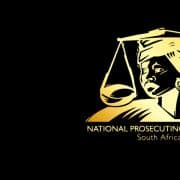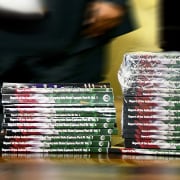|
Getting your Trinity Audio player ready...
|
President Cyril Ramaphosa will no longer be bestowing veteran television and film producer Duma Ndlovu with the National Order of Ikhamanga this week, following objections from, among others, the ANC Veterans League (ANCVL). The league made a public plea for Ramaphosa to revoke Ndlovu’s nomination on grounds of serious state capture allegations against him. These were revealed in March 2021 in testimony at the Zondo commission.
The public also lodged objections against the nominations of broadcaster Freek Robinson and explorer Mike Horn, and they too will no longer receive the prestigious award. The national orders ceremony is expected to take place on Friday 28 April 2023.
The allegations against Nldovu relate to a company at which he is a director, Ambrobrite, named in the evidence of whistle-blower and former Bain and Company consultant Athol Williams, as one of the beneficiaries of irregular contracts through which millions of rands were siphoned from the South African Revenue Service (Sars). Ambrobrite is listed as an events, communications, and project management consultancy, and was said by Williams to have enjoyed preferential treatment from Bain South Africa’s (SA) former managing partner, Vittorio Massone.
Bain allegedly paid Ambrobrite R3.6-million a year to connect the advisory firm with influential politicians and leaders of state-owned entities, said Williams, who was in charge of investigating the firm’s relationship with Sars during his time there. The company, which Ndlovu co-directs with a man known as Mandla kaNozulu, was first contracted to Bain on November 2013, and the contract was renewed every six months until June 2016.
It was also through Ambrobrite’s efforts, Williams testified, that Massone met former president Jacob Zuma. The pair would allegedly meet several times during 2014, as evidenced by entries in Massone’s diary recording meetings with “ubaba.” Over the course of these meetings, which would later include Tom Moyane, a strategy was developed to pave the way for his entry into Sars, and the service’s irregular relationship with Bain, the Zondo commission into state capture found.
Following numerous payments from Bain SA to Ambrobrite, concerns were raised by senior management of Bain globally, who wanted to know if the company and its directors had been vetted by Massone, as was the company’s requirement. This, said Williams, because Ambrobrite was the company’s second highest paid service provider globally, but it did not even have a compliant tax certificate. Among the events that Bain SA paid for was a party for the ANC youth league in late 2013, at a cost of R50 000.
Ndlovu has enjoyed an illustrious career in television, spanning some time. Through his Word of Mouth Productions, he created Muvhango, one of the SABC’s flagship soapies, which first went into production in 1997. He has since been linked to several other productions over the years.
But the ANCVL says he is undeserving of the Order of Ikhamanga, which is awarded to South African citizens who have excelled in the fields of arts, culture, literature, music, journalism, or sport, until he has been cleared of the allegations of impropriety.
Ndlovu’s nomination is not the first move by the presidency in recent times to be perceived as ignoring red flags so as to reward people implicated in corruption. In his March cabinet reshuffle, Ramaphosa retained three ministers on his cabinet who were also implicated in the commission:
- Arts and Culture Minister Zizi Kodwa was found by the commission’s chairperson, Chief Justice Raymond Zondo, to be a “compromised public servant”, having allegedly received cash payments for his influence in state contracts in which IT giant EOH was a bidder. At the time of the payments, Kodwa was not in public office, but held a senior position in the ANC as its spokesperson. Kodwa admitted to having received the payments, amounting to around R1.7-million over 2014 and 2015, but told the commission that they were loans for which repayment was expected. Zondo recommended in his final report that Ramaphosa consider if it is in the best interest of the integrity of his cabinet to retain Kodwa, who was, by the time of his report, the deputy minister of state security. Instead, Kodwa was promoted to minister following the reshuffle.
- His colleague and Minerals and Energy Minister Gwede Mantashe was retained in his positions, despite a recommendation by Zondo that he be criminally investigated for his relationship with the company formerly known as Bosasa. Mantashe is alleged to have received security upgrades at his three properties, at Bosasa’s cost. His explanation before the commission and after the findings by Zondo, which the latter found “unconvincing”, was that former Bosasa executive Papa Leshabane gifted the Mantashe family the upgrades as a family friend.
- Police Minister Bheki Cele is another who has been implicated before the commission. In-camera witness and crime intelligence official Colonel Dhanajaya Naidoo told the commission in 2019 that Cele interfered in investigations of the crime intelligence unit during his tenure as police commissioner. This was corroborated by senior Hawks investigator Kobus Roelofse, who was part of the team probing the conduct of former crime intelligence Richard Mdluli. Furthermore, Cele was named by former acting inspector-general of intelligence Setlhomamaru Dintwe as one of the ministers who had tried to interdict his testimony before the commission by complaining to Ramaphosa. Zondo did not make conclusions on the criminal justice matters in which Cele was implicated, recommending that these be taken over by law enforcement agencies instead.








